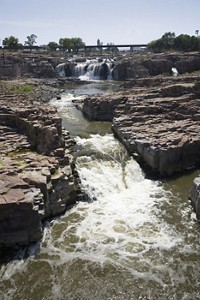Advertisement
Grab your lab coat. Let's get started
Welcome!
Welcome!
Create an account below to get 6 C&EN articles per month, receive newsletters and more - all free.
It seems this is your first time logging in online. Please enter the following information to continue.
As an ACS member you automatically get access to this site. All we need is few more details to create your reading experience.
Not you? Sign in with a different account.
Not you? Sign in with a different account.
ERROR 1
ERROR 1
ERROR 2
ERROR 2
ERROR 2
ERROR 2
ERROR 2
Password and Confirm password must match.
If you have an ACS member number, please enter it here so we can link this account to your membership. (optional)
ERROR 2
ACS values your privacy. By submitting your information, you are gaining access to C&EN and subscribing to our weekly newsletter. We use the information you provide to make your reading experience better, and we will never sell your data to third party members.
Environment
Clearing Up Muddy Waters
Controversy churns over effort to clarify which waterways and wetlands are governed by the Clean Water Act
by Jessica Morrison
December 1, 2014
| A version of this story appeared in
Volume 92, Issue 48

The Obama Administration is moving to clear up a pivotal issue under one of the nation’s keystone environmental laws, the Clean Water Act, which controls pollution in rivers, lakes, and other waterways. The federal government is preparing a regulation that would clarify which types of waterways and wetlands fall under the purview of that law and which don’t.
The Administration’s move is once again pitting congressional Republicans against the President and some industries against other businesses and environmental advocates. Regulators and many backers of the move claim the planned rule would reduce confusion about which areas are protected by the Clean Water Act and would cover and further protect drinking water supplies that now serve more than 100 million Americans. Opponents, meanwhile, characterize the Administration’s effort as a power grab that threatens landowner property rights.
The proposal comes after a splintered Supreme Court decision in 2006 left questions unanswered about the Clean Water Act’s jurisdiction. Legal experts initially expected federal lawmakers to resolve the issue, but a gridlocked Congress didn’t act. For several years, Congress, state and local governments, as well as industry and environmental groups, among others, have instead turned to the Administration for guidance. The American Chemistry Council, a chemical industry trade group, supports the clarification effort, seeking greater certainty about when Clean Water Act permits are needed for discharging wastewater or developing lands that contain wetlands.
To that end, the Environmental Protection Agency and the U.S. Army Corps of Engineers proposed a rule in April that addresses language Congress wrote into the 42-year-old Clean Water Act. The wording grants EPA and the Army Corps the authority to regulate waters with a “significant nexus” to “navigable waters.” The proposal would specify exactly what is included.
Most of the controversy surrounding the proposal is centered around its provisions on certain wetlands. The proposal would require landowners who wish to develop property that includes wetlands that are adjacent to rivers and streams to get a permit to do so. It would also specify how regulators will determine whether permits are needed to develop certain isolated wetlands.
Another point of contention concerns intermittent streams, which are dry at some point in the year. Under the proposal, Clean Water Act protections and regulations would apply to intermittent streams, many of which are found in the western U.S. This would prevent businesses from discharging wastewater into these waterways without a pollution permit.
“Up to 117 million people rely on waters that run seasonally, as opposed to 24 hours a day, every day,” says EPA Administrator Gina McCarthy, explaining why sometimes-dry waterways would be included.
Supporters assert that the proposal would make only slight changes to current regulatory practices.
“The rule would improve the efficiency of the [regulatory] system and would really only marginally increase what is actually covered by the law,” says Jon Devine, an attorney with the Natural Resources Defense Council, an environmental advocacy group. EPA estimates that the proposed rule would increase the areas covered by current practices by 3%. The agency argues that because the proposal would exclude some areas that were previously covered, including some drainage ditches, the federal government is not significantly increasing its regulatory reach.
But Republicans in Congress disagree and are calling on the Administration to abandon the planned regulation. “It presents a grave threat to Americans’ property rights,” several GOP lawmakers recently wrote to EPA and the Army Corps in response to the proposal. The members argue that the rule would create a hardship for homeowners, small businesses, and local communities.
The Republican-led House of Representatives has approved a handful of bills intended to stymie the proposed rule. One, H.R. 5078, which the House passed in September, would prohibit the agencies from finalizing the rule and require that it be withdrawn. Although the Democrat-led Senate isn’t likely to take up the bill this year, House lawmakers may reintroduce and pass the legislation again next year so that the new, Republican-controlled Senate, which takes office next month, can consider it.
EPA and the Army Corps could produce a final rule by mid-2015, but legal experts say that court challenges are likely to delay its implementation for years.




Join the conversation
Contact the reporter
Submit a Letter to the Editor for publication
Engage with us on Twitter